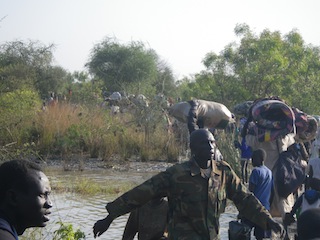South Sudanese armed opposition does not seek revenge in Juba: official
October 11, 2015 (ADDIS ABABA) – South Sudanese armed opposition faction led by former vice-president, Riek Machar, dismissed allegations that the opposition fighters were seeking for a revenge in the national capital, Juba, saying what they wanted was a “deterrent” force in the capital.

He was responding to widespread speculations that the opposition faction wanted Ugandan forces to withdraw from South Sudan so that they could make a revenge for the massacre of allegedly 20,000 members of the ethnic Nuer civilians in Juba in December 2013 when the war erupted.
This fear of revenge seems to be shared among members of the international community as the United States has been pushing the opposition leader, Machar, to sign minutes of the security arrangement which gives the opposition army a small number of forces to be deployed in the capital during the first half of the 30-month long transitional period before unification.
The government in the minutes it signed drawn from the military workshop in Addis Ababa, Ethiopia, demanded 5,000 troops to remain in Juba in addition to 3,000 presidential guards, and would also share an extra joint police with the opposition.
The opposition refused to sign the document, arguing that there was need to limit the number of forces that will remain in Juba in accordance with the spirit of the peace agreement which called for demilitarization of the capital.
Machar’s group suggested a joint police force of 3,000, composed of 1,500 each from the two rival forces and a limited number of 700 troops for joint presidential guards and those guarding barracks, bases and warehouses.
“If we sought for a revenge in the capital we wouldn’t be propagating for deployment of a small size of joint force inside Juba,” Dak told Sudan Tribune on Sunday.
“We thought US should be supporting demilitarization of Juba as stipulated in the peace agreement instead of putting pressure on us to sign the presence of huge number of government forces in the capital,” he said.
But observers say the US government seems to be mindful of a revenge situation if the opposition forces were to have equal numbers of forces with the government in the capital, preferring to put president Salva Kiir’s forces in the upper hand in case the Ugandan forces withdraw.
The opposition official however said giving the government more forces in Juba would make it possible for president Kiir to repeat the 2013 massacre.
“Having a small size of joint forces in Juba with equal numbers in composition would deter both parties from repeating the December 2013 genocide,” he added.
He said the same composition would also apply in the other state capitals and major towns where demilitarization will also take place.
The opposition leader, Machar, who is the first vice-president designate in accordance with the executive power sharing in the peace deal, while in Washington on Wednesday told the US administration that he will not accept to return to Juba to be “slaughtered” by president Kiir unless a workable security arrangement was put in place to guarantee his safety together with his officials.
Dak also blamed the US for being behind the “quick deployment” of Ugandan People’s Defence Forces (UPDF) in Juba in 2013 just days after the eruption of the violence, adding that 20,000 Nuer innocent civilians were massacred in Juba in the presence of US diplomats who said nothing to condemn president Kiir’s leadership for the “genocide.”
Also, when the opposition fighters defeated government troops in January 2014 by capturing Bor, Jonglei state’s capital, and were advancing towards Juba, the US government also became “furious”, urging the opposition leadership to stop the advance, warning not to take over Juba or militarily overthrow president Kiir’s government.
He further claimed that Ugandan forces also directly participated in the combat with excessive use of air force, dropping even internationally banned cluster bombs on the fighters and civilians on Juba-Bor road.
Ugandan troops are supposed to withdraw from South Sudan on Saturday, 10 October, according to the timetable reached at the military workshop between the rival army commanders.
The deadline has however run behind the schedule while UPDF remains intact in the region.
The opposition official said their team composed of senior officers is ready to resume the workshop and reach an agreement with the government on the outstanding issues in the security arrangements.
(ST)
